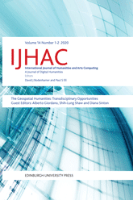
International Journal of Humanities and Arts Computing-A Journal of Digital Humanities
Scope & Guideline
Innovating Research with Digital Tools for Humanistic Inquiry
Introduction
Aims and Scopes
- Digital Pedagogy:
The journal emphasizes the development and exploration of digital pedagogical techniques, particularly in the context of teaching humanities subjects. This includes case studies on how digital tools can enhance learning experiences in various disciplines. - Digital Archives and Preservation:
A significant focus is placed on the creation and utilization of digital archives, which serve as resources for remembrance and research. The journal promotes projects that develop digital archives and methodologies for preserving cultural heritage. - Textual Analysis and Digital Humanities Methods:
The journal showcases research that employs computational methods such as text mining, named entity recognition, and digital editing to analyze literary and historical texts, reflecting a methodological expansion in the humanities. - Interdisciplinary Approaches:
The journal encourages interdisciplinary research that combines insights from various fields to address complex questions in the humanities, often integrating perspectives from computer science, linguistics, and cultural studies. - Crisis Response in Humanities:
Recent publications highlight the role of digital humanities in responding to crises, such as educational disruptions caused by the pandemic, showcasing adaptive strategies in teaching and research.
Trending and Emerging
- Impact of Artificial Intelligence on Humanities:
Recent publications, especially those discussing AI's role in education and research, indicate a growing interest in how AI technologies can enhance and transform humanities scholarship. - Collaborative and Community-Based Digital Projects:
There is a rising trend towards collaborative digital projects that engage communities in the humanities, reflecting a shift towards inclusivity and participatory research methodologies. - Global Perspectives in Digital Humanities:
The emergence of studies focused on the digital humanities in non-Western contexts, particularly in Africa and Asia, suggests an expanding global perspective that values diverse cultural narratives and methodologies. - Data-Driven Approaches in Humanities Research:
The journal is increasingly featuring papers that utilize data-driven methods, such as machine learning and data visualization, to explore literary texts and historical data, indicating a methodological evolution in the field. - Resilience and Adaptation in Humanities Education:
Research addressing the adaptation of humanities education in response to crises, such as the COVID-19 pandemic, highlights an emphasis on resilience and innovative teaching practices.
Declining or Waning
- Traditional Humanities Scholarship:
There is a noticeable decline in papers focused solely on traditional humanities scholarship without a digital component. This indicates a shift towards integrating digital methods and tools in humanities research. - Static Historical Analysis:
Research that does not incorporate interactive or dynamic methodologies is becoming less frequent. The trend suggests a preference for studies that engage with data visualization or digital representation of historical narratives. - Regional Studies with Limited Digital Application:
Papers focusing on regional studies that do not leverage digital tools or frameworks are appearing less frequently. This reflects a broader movement towards global perspectives that utilize digital humanities methodologies.
Similar Journals
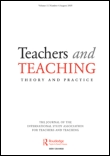
Teachers and Teaching
Unveiling New Perspectives in Arts and Humanities EducationTeachers and Teaching is a premier scholarly journal published by Routledge Journals, Taylor & Francis Ltd, providing an essential platform for researchers, educators, and practitioners in the fields of Education and Arts and Humanities. With an editorial focus on the dynamics of teaching and learning, the journal aims to share innovative research and insightful discussions that enhance pedagogical practices and policy development. Notably, it has achieved a Q1 ranking in both the Arts and Humanities and Education categories, signifying its impact and relevance in educational research, as reflected in its Scopus rankings, with an 84th percentile for Arts and Humanities and a 76th percentile in Education. Although it does not offer open access, the journal provides extensive access options for libraries and institutions, making its rich content available to a wide audience. Spanning from 1995 to 2024, Teachers and Teaching continues to set the standard for high-quality scholarship in the evolving landscape of education, inviting contributions that explore challenges and innovations in teaching methodologies.

Anales de Documentacion
Exploring New Horizons in Documentation ResearchAnales de Documentacion is a distinguished open-access journal published by UNIV MURCIA, contributing significantly to the field of Library and Information Sciences since its inception in 1998. With a focus on the dissemination of innovative research and studies, this journal serves as a vital resource for researchers, professionals, and students engaged in the dynamic landscape of documentation and information management. Although coverage in Scopus was discontinued from 2013 to 2020, the journal continues to hold its place in the academic community, ranking #167 out of 227 in the Social Sciences category, reflecting its commitment to quality and relevance. The journal's accessibility enhances its utility, making vital research available to a broad audience, thereby fostering collaboration and scholarly exchange in the evolving discourse of information sciences. Its address at the Edificio Pleiades on the Campus de Espinardo in Murcia, Spain, further signifies its role as a central hub for academic inquiry and exploration in this essential field.
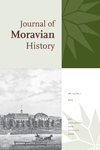
Journal of Moravian History
Highlighting the Significance of Moravian Religious DimensionsWelcome to the Journal of Moravian History, a prominent academic periodical published by Penn State University Press. With a focus on the intricate tapestry of Moravian history and its religious dimensions, this journal caters to scholars, historians, and students who seek to deepen their understanding of this unique cultural heritage. Having converged from 2014 to 2023, the journal has established itself within the Q4 category in both History and Religious Studies, as recognized in the 2023 assessments, and it ranks respectively in the 60th percentile for Religious Studies and 58th percentile for History in Scopus evaluations. While the journal is not open access, it provides valuable insights and rigorous research that enriches the academic dialogue surrounding Moravian studies. With a commitment to advancing scholarship and fostering a greater appreciation for this influential community, the Journal of Moravian History remains an essential resource for those passionate about historical and religious analysis.
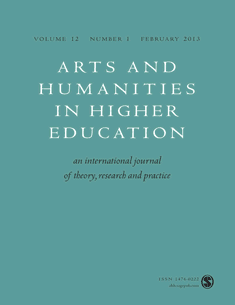
Arts and Humanities in Higher Education
Cultivating Interdisciplinary Insights in the ArtsWelcome to Arts and Humanities in Higher Education, an esteemed journal published by SAGE Publications Ltd. With an ISSN of 1474-0222 and E-ISSN of 1741-265X, this journal serves as a crucial platform for the exploration of innovative pedagogical practices, interdisciplinary research, and the evolving dynamics of arts and humanities within the university setting. Since its inception in 2002, it has made significant strides, achieving a notable Q1 ranking in Visual Arts and Performing Arts and a Q3 ranking in Education, as per the latest 2023 categorization. Our readership encompasses researchers, educators, and practitioners committed to fostering a vibrant dialogue about the future of arts and humanities education. Although the journal is not open access, it provides invaluable insights and empirical studies that contribute to scholarship and practice. With Scopus rankings highlighting its significant impact, including a 96th percentile rank in Visual Arts and Performing Arts, this journal stands as a beacon for scholars eager to influence the field. We invite you to engage with the rich tapestry of knowledge and innovation presented in our pages, aimed at shaping the future of higher education in the arts.

Etic net-Revista Cientifica Electronica de Educacion y Comunicacion en la Sociedad del Conocimiento
Bridging Theory and Practice in Education and CommunicationEtic net-Revista Cientifica Electronica de Educacion y Comunicacion en la Sociedad del Conocimiento, published by UNIV GRANADA, is a pioneering open-access journal dedicated to the exploration and dissemination of research in the fields of education and communication within the context of knowledge society. Since its inception in 2002, this journal has provided a platform for scholars, researchers, and practitioners to share innovative ideas and empirical studies, fostering critical dialogue and collaboration in the rapidly evolving landscape of digital education and communication. With its ISSN 1695-324X, Etic net aims to bridge theoretical frameworks and practical applications, contributing significantly to the scholarly discourse and practices that shape contemporary educational experiences globally. Through its commitment to open access, the journal ensures that high-quality research is freely available to all, promoting inclusivity and accessibility in academic publishing. We invite you to explore the latest findings and contribute to shaping the future of education and communication by engaging with this essential resource.
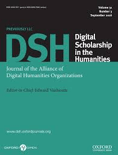
Digital Scholarship in the Humanities
Redefining Research: Embracing Digital Tools in Humanities.Digital Scholarship in the Humanities is a premier journal published by Oxford University Press, dedicated to advancing research at the intersection of digital technology and the humanities. With an ISSN of 2055-7671 and an E-ISSN of 2055-768X, this journal serves as a vital platform for scholars exploring the vast potentials of digital methodologies in humanities disciplines, particularly in linguistics and language studies. Recognized within the Q1 quartile for linguistics and language categories, it stands out with notable Scopus rankings, including top positions within the 80th percentile for Arts and Humanities. The journal emphasizes open access to promote broader dissemination of knowledge, making it accessible to a diverse audience of researchers, students, and professionals. Spanning from 2015 to 2024, Digital Scholarship in the Humanities aims to foster interdisciplinary collaboration and innovation, reflecting the growing importance of digital tools in redefining scholarship.

Digital Humanities Quarterly
Connecting minds in the digital humanities landscape.Digital Humanities Quarterly, published by the Alliance Digital Humanities Organizations, is a leading open-access journal since 2007, dedicated to advancing research at the intersection of digital technologies and the humanities. With a noteworthy ISSN of 1938-4122, this journal serves as a vital platform for scholars engaging in innovative digital methodologies across diverse fields, including arts and humanities, communication, library sciences, and computer networks. Over its converged years from 2018 to 2024, it has earned impressive rankings, notably being placed in Q2 among peers (2023) in Arts and Humanities, Communication, and Library and Information Sciences. With an impact on critical discourse and practice in digital scholarship, Digital Humanities Quarterly is essential for researchers, professionals, and students aiming to understand and contribute to this dynamic field. The journal is based in the United States at Snell Library 213, Northeastern University, Boston, MA 02115, and strives to connect a global audience through its unrestricted access model.

Manuscript Studies-A Journal of the Schoenberg Institute for Manuscript Studies
Fostering Dialogue in Manuscript StudiesManuscript Studies: A Journal of the Schoenberg Institute for Manuscript Studies, published by University of Pennsylvania Press, serves as a pivotal resource in the intertwined fields of conservation, library sciences, and literature. With an ISSN of 2381-5329 and an E-ISSN of 2380-1190, the journal has been actively contributing to academic discourse since its inception in 2016 and continues to resonate through 2024. The journal is categorized in the Q3 quartiles for Conservation and Library and Information Sciences, and Q2 for Literature and Literary Theory, reflecting its relevance and credibility within these disciplines. While it is not an open-access journal, its vital scholarship is crucial for researchers and professionals dedicated to the preservation and interpretation of manuscripts. Positioned within the competitive arenas of Scopus rankings, Manuscript Studies highlights significant contributions to the understanding of manuscript collections, offering interdisciplinary perspectives that are essential for students and scholars alike. Whether delving into the complexities of textual transmission or exploring methodologies in manuscript conservation, Manuscript Studies remains an invaluable platform for advancing knowledge and fostering dialogue in the study of manuscripts.

Zivot Umjetnosti
Connecting researchers and practitioners in the arts.Zivot Umjetnosti, published by the INST POVIJEST UMJETNOSTI - INST ART HISTORY, is a notable Croatian journal that serves as a platform for scholarly discourse in the fields of visual arts, performing arts, and museology. With its inception in 2008, the journal has continued to provide a voice for researchers and practitioners alike, contributing significantly to ongoing conversations in the arts. Despite its current Q4 rank in both Visual Arts and Museology categories—placing it within the 21st and 17th percentiles, respectively—Zivot Umjetnosti is recognized for its commitment to advancing knowledge and fostering critical dialogue. The journal aims to bridge theoretical frameworks with practical applications, making it an invaluable resource for academics, curators, and students engaged in artistic research. While currently operating under traditional access options, Zivot Umjetnosti remains a fundamental publication for those wishing to explore and expand their understanding of the dynamic intersection of art and culture in Croatia and beyond.
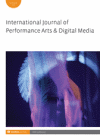
International Journal of Performance Arts and Digital Media
Innovating the Future of Performance Arts and Digital MediaInternational Journal of Performance Arts and Digital Media, published by Routledge Journals, Taylor & Francis Ltd, stands at the forefront of interdisciplinary research encompassing the dynamic fields of performance arts and digital media. With an ISSN of 1479-4713 and an E-ISSN of 2040-0934, this esteemed journal has been a vital platform since its inception in 2005, highlighting significant contributions to both Visual Arts and Communication. As evidenced by its impressive rankings—Q1 in Visual Arts and Performing Arts and Q2 in Communication for 2023—the journal's high-impact research caters to a diverse audience, making it invaluable for academics, practitioners, and students alike. Though it follows a traditional subscription model and does not currently offer open access options, the International Journal of Performance Arts and Digital Media remains committed to publishing cutting-edge scholarship and critical dialogues that explore the intricate relationships between artistic expression and digital technologies. Its rigorous peer-review process ensures that all published works meet the highest academic standards, fostering an environment of innovation and creativity within its community.